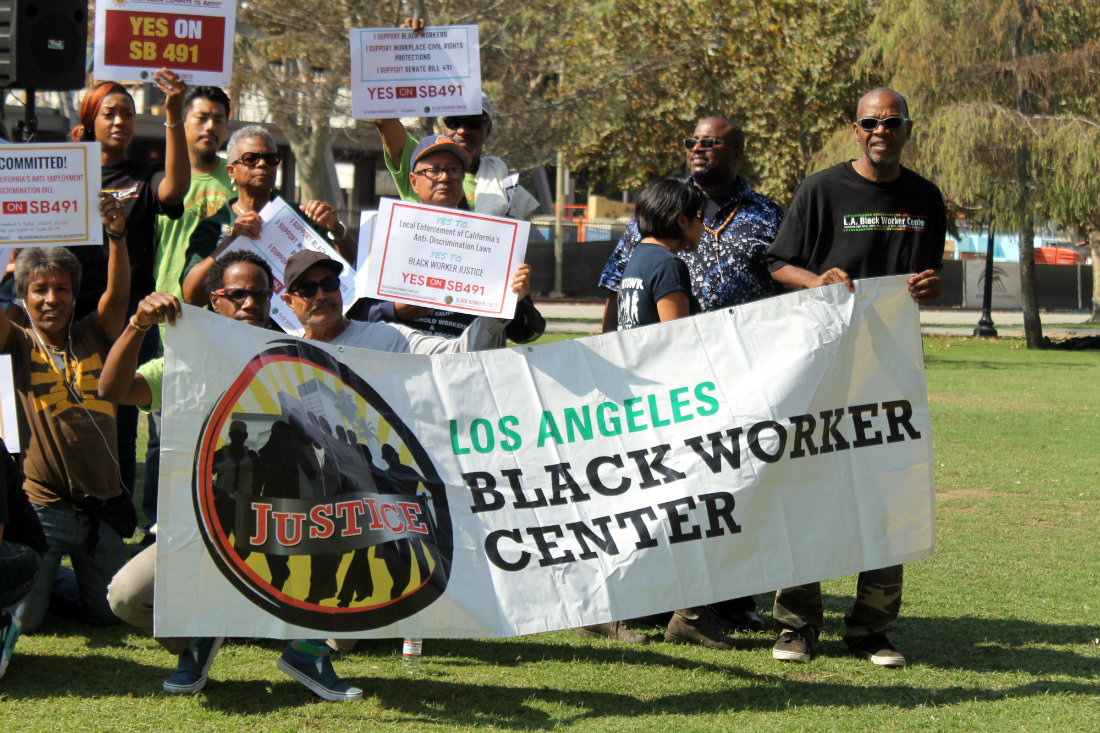Racism and white supremacy are powerful, shapeshifting forces. They have persisted in our culture, politics and economy across time and space. Even as our nation makes progress, the power of white supremacy changes shape, creating new ways to limit it. It has different names and uses different tools, but leads to the same outcomes. It’s how slavery mutated into mass incarceration, the war on drugs, police brutality, workplace discrimination, and persistent low wages—recreations of the chokeholds of slavery.
Now white supremacy is evolving to attack unions and suffocate economic freedom and security. For these reasons advocates for fair wages are watching Janus v. AFSCME, a case currently before the Supreme Court that may effectively spell the end for public sector unions, which created the single largest pathway into the middle class for African American families.
It’s also the reason why Black workers across the country joined a national Working People’s Day of Action, on Feb. 24, and demandd an end to a racialized, rigged economy that puts workers last.

The plaintiff in the case is challenging the way AFSCME collects dues, recruits and maintains membership. If the plaintiff prevails, all public employee unions will have fewer resources and spend more time trying to stay afloat and less time and staff to build the power we need to win at the bargaining table. That means smaller paychecks and less family time.
African Americans have as much at stake in maintaining strong unions as anyone with regards to economic security, affordable healthcare and retirement benefits. Department of Labor data shows that almost 20 percent of African Americans work in public sector jobs. An African American union member makes 16.4 percent more than the same person in the same job without a union. African American union members are also much more likely to have health insurance and retirement benefits than African Americans working without a union.
Unions negotiate the terms of our employment and provide tools to address racial discrimination on the job. They ensure pay equity and the right to due process when issues arise. And at their best, unions fight for the issues our communities hold dear. For example, the AFL-CIO has an official position vowing to oppose and end mass incarceration.

The public sector has provided a ladder for Black workers to climb into the middle class. For example, in the 40’s, the Urban League pushed private and public sector companies to hire Black workers in clerk and manager positions. These jobs were later supported by unions, which helped expand the Black middle class. Furthermore, both before and after the onset of the Great Recession, African Americans were 30 percent more likely than other workers to be employed in the public sector.
Public sector jobs are one of the main ways our community has had an opportunity to get a fair paycheck and middle class security that anchored us and help us provide for our families. We became teachers, cafeteria staff and school bus drivers. We drive the snowplows, fix potholes and maintain the sidewalks. We are the construction workers who keep libraries and public buildings operating safely.
We are social workers that make sure people access the public benefits they need. We keep parks open, provide security for public spaces and pick up your trash.
You don’t have to look outside our treasured civil rights history to know that some of these jobs weren’t always good jobs. They became good jobs, in part because African Americans played a major role in organizing unions to negotiate pay, benefits and working conditions. We joined together collectively and bargained for our rightful share of the pie. As a result, jobs that were once dangerous, undervalued, and low-paying became a decent and honest way to make a living.

Black workers’ history, includes a legacy of fighting for economic justice, civil rights and the dignity of every hard work. In 1968, when Dr. Martin Luther King, Jr. was assassinated, he was in Memphis supporting striking sanitation workers fighting against dangerous working conditions and to win a union. Echol Cole and Robert Walker were crushed to death on the job by a malfunctioning trash truck that February.
Twelve days later, on Feb. 24, workers went on strike, carrying the signs declaring I AM A MAN. We built these unions, including AFSCME Local 1733, which represents sanitation workers in Memphis today.
In contrast, institutions like the Supreme Court, racially biased corporations, the federal and local governments have a long history of supporting white supremacy and fueling anti-labor sentiment.
The connection between poisonous, racists ideology and the systematic dismantling of public sector unions is that they are both aimed at stifling people’s ability to build power. In the same way, it sets a callous course for the economic ruin African American workers. Together we will defend the freedoms that Black workers fought and died for, including the freedom from hate, the freedom to vote, and the freedom to join together in strong unions.
Let’s never forget the struggles of our past. Let’s help move America forward. Let’s continue to stand together with Black workers and our communities to demand better jobs, better lives and secure futures. We all deserve that, and we are only going to get it by fighting together.
Source: Op-ed article was penned by Tanya Wallace-Gobern, Executive Director of the National Black Worker Center Project (NBWCP).

News4usonline is a multi-ethnic driven website focused on providing readers with an alternate view on social issues, sports, lifestyle news, entertainment and culture as it relates to the various communities we cover. The end goal for News4usonline is to provoke thought as well as to uplift, inspire and encourage through artful storytelling.

